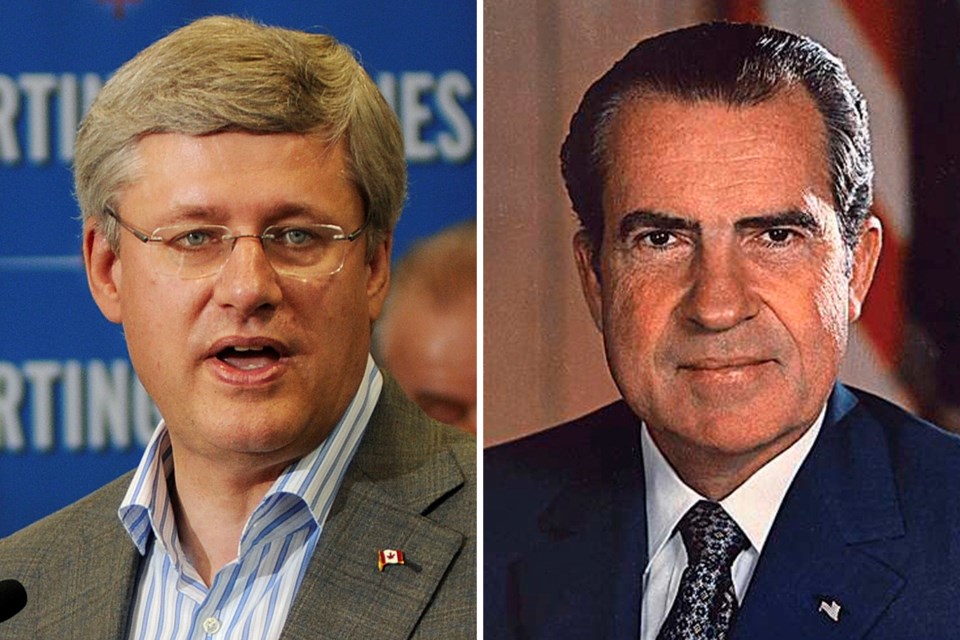I drew my first political cartoon at the age of 12, of U.S. president Richard Nixon as a dove clenching an olive branch while squatting on a black egg with tailfins. It was for an assignment in social studies class, meant to sum up the ambivalent public image of the president at the time: the broker of détente with Red China versus the warmonger who conducted covert bombing raids on Cambodia.
Looking back at years of blackening blank paper with political caricatures, I can now see an uncanny resemblance between the late, disgraced prez and Canada’s current PM — in word and deed, rather than appearance.
Foul mouth, explosive temper, social isolation? Check. (See reporter John Ibbutson’s recent article in the Globe and Mail.)
Embracing a culture of surveillance? Check. Nixon directed the FBI to investigate clear and present dangers like the first Earth Day on April 22, 1970, while his aide Henry Kissinger ordered wiretaps on other White House staff and newspaper reporters. In contrast, Harper has issued gag orders to his own federal scientists and researchers. He introduced Bill C-51, which may allow future governments to interpret democratic dissent as a national security threat.
Turning elected office into a private fiefdom? Check. Nixon ended his White House days with a garrison mentality. Harper has made the PMO into the arbiter of parliamentary will in Ottawa, while demanding his MPs behave like parrots with talking points. (Before the plan was rescinded, civil servants were directed to head documents with “The Harper Government of Canada.”)
A July 2014 Globe and Mail study determined that “Ottawa has funnelled 83 per cent of the projects under its signature infrastructure fund to Conservative-held ridings.” If that’s not using federal power for political ends, I don’t know what is.
Enthusiasm for militarism? Check. Nixon campaigned on withdrawing troops from Vietnam and once elected, escalated the invasion of Southeast Asia. Harper, though obviously not of this calibre or caliber, endorses Canadian airstrikes in the Mideast while presiding over our nation’s rise as a global arms contractor.
Official contempt? Check. Nixon was found in contempt of Congress in 1974, leading to his impeachment. Harper’s government was found in contempt of Parliament in 2011, a first in Canadian history, leading to… an election call.
Assault on the environment? No check here. Nixon signed the Clean Air Act Extension, the Safe Water Drinking Act, the Endangered Species Act, and other significant pieces of environmental legislation. In contrast, Harper has trashed the Kyoto Protocol, scrapped the Navigable
Water Protection Act and closed down Department of Fisheries and Oceans libraries across the country, leading to a loss of invaluable books and documents.
In key areas, old Helmet Hair is actually worse than Tricky Dicky. Nixon’s administration created the Public Broadcasting System, while the Harper government is out to gut the Canadian Broadcasting Corporation. No president ever turned the lights out on Congress, but the PM has shuttered Parliament twice through proroguing.
From using the Canada Revenue Agency as a bludgeon against non-profits and charities that dare question government policies, to eliminating the long-form census and cutting funds to Statistics Canada, the lengthy list of parliamentary offences committed by the Harper regime would take up an entire edition of this paper, including the ad space.
Tory apologists will tell you the economy has performed well under the party’s reign — and it has, for a select demographic. In 2012, the 86 wealthiest Canadians resident individuals (and families) possessed the same amount of wealth as the poorest 11.4 million Canadians combined.
Back when I drew that cartoon of a bomb-hatching Nixon, our nation was held in high regard internationally as a broker of peace. On the domestic front, the feds exercised fairly progressive ideas about creating greater good for the greatest number. My father was just able to support a wife and four kids on a lower-middle class income. That Canada is gone and the Harperites appear to be, in military parlance, out to “make the rubble bounce twice.”
Many believe this to be the most important election in Canadian history. Hence online initiatives like the Vote Together campaign, which promotes strategic voting to deny another win to the Nixon of the North. Me, I drew the line on this character a long time ago.
www.geoffolson.com
@geoffolson



